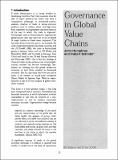| dc.contributor.author | Humphrey, John | en |
| dc.contributor.author | Schmitz, Hubert | en |
| dc.date.accessioned | 2016-02-01T13:51:29Z | |
| dc.date.available | 2016-02-01T13:51:29Z | |
| dc.date.issued | 01/07/2001 | en |
| dc.identifier.citation | Humphrey, J. and Schmitz, H. (2001) Governance in Global Value Chains. IDS Bulletin 32(3): 19-29 | en |
| dc.identifier.issn | 1759-5436 | en |
| dc.identifier.uri | https://opendocs.ids.ac.uk/opendocs/handle/20.500.12413/8755 | |
| dc.description.abstract | Summaries The concept of ‘governance’ is central to the global value chain approach. This article explains what it means and why it matters for development research and policy. The concept is used to refer to the inter?firm relationships and institutional mechanisms through which non?market co?ordination of activities in the chain takes place. This co?ordination is achieved through the setting and enforcement of product and process parameters to be met by actors in the chain. In global value chains in which developing country producers typically operate, buyers play an important role in setting and enforcing these parameters. They set these parameters because of the (perceived) risk of producer failure. Product and process parameters are also set by government agencies and inter?national organisations concerned with quality standards or labour and environmental standards. To the extent that external parameter setting and enforcement develop and gain credibility, the need for governance by buyers within the chain will decline. | en |
| dc.format.extent | 11 | en |
| dc.publisher | Institute of Development Studies | en |
| dc.relation.ispartofseries | IDS Bulletin Vol. 32 Nos. 3 | en |
| dc.rights.uri | http://www.ids.ac.uk/files/dmfile/IDSOpenDocsStandardTermsOfUse.pdf | en |
| dc.title | Governance in Global Value Chains | en |
| dc.type | Article | en |
| dc.rights.holder | © 2001 Institue of Development Studies | en |
| dc.identifier.doi | 10.1111/j.1759-5436.2001.mp32003003.x | en |

